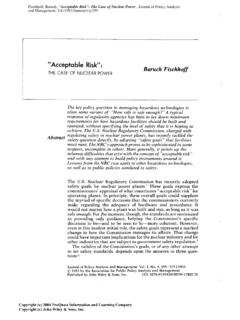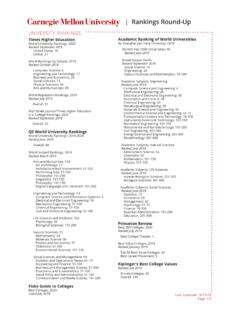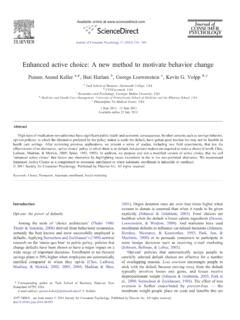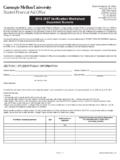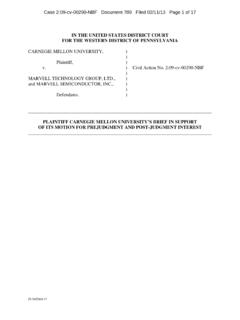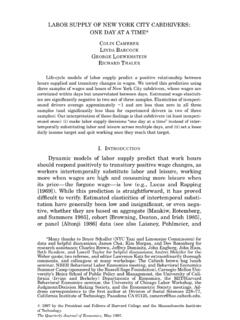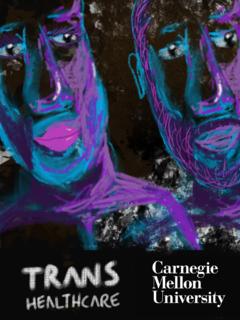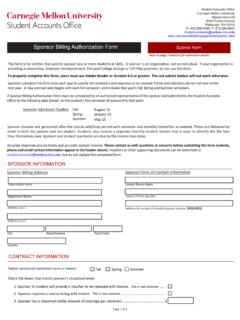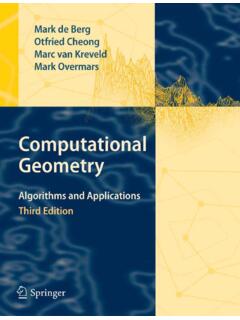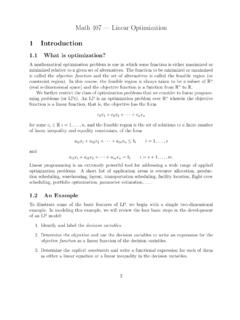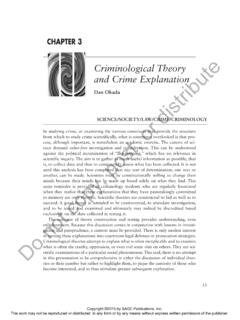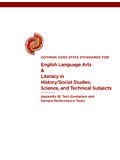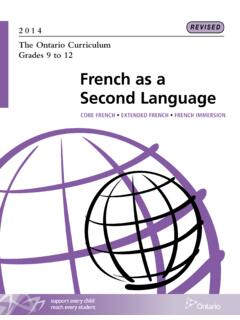Transcription of 2021 Pre-College Summer Session Online Courses 2021-05-18
1 2021 Pre-College Summer Session Online course List This course list was updated on 2021-05-18 . See the last page of this document for a changelog. Courses meet daily unless otherwise noted. Full Courses at Carnegie Mellon carry 9 to 12 units, corresponding to 3 to 4 credits at other colleges and universities. Pre-College Summer Session students are allowed to enroll in 23 or fewer units, because the Courses in this six-week Summer term cover material from the longer fall and spring semesters and we have found students who enroll in excessive units cannot experience everything Pre-College Summer Session has to offer. Students who do enroll in 23 units may be expected to study challenging Carnegie Mellon academic material for at least 57 hours every week. For more information, contact the Pre-College Summer Session Director, Dr. William Alba 412-268-7333). Newly listed Courses for the Pre-College Summer Session in 2021 include: 21-127 Concepts of Mathematics 33-115 Physics for Future Presidents 33-141 Physics for Engineering Students I 33-142 Physics for Engineering Students II 73-102 Principles of Microeconomics 76-234 Media: Past, Present, and Future 79-277 From Venice to Chicago: How The Ghetto Came to America 79-282 Europe and the World Since 1800 80-100 Introduction to Philosophy 80-212 Arguments and Logical Analysis 82-133 Elementary Chinese Online I 82-134 Elementary Chinese Online II 82-162 Elementary Italian II 82-172 Elementary Japanese II 82-173 Introduction to Japanese I 82-174 Introduction to Japanese II 82-278 Japanese Film and Literature: The Art of Storytelling Enrollment information Visit the enrollment portal for up-to-date course availability and class times.
2 Additional Online Courses may be available during the university s concurrent Summer Session 2 for appropriately prepared students. For other Courses , both the faculty member teaching the course and the Pre-College Summer Session Director must authorize your choice. For a complete listing of available Summer Session 2 Courses , contact Dr. William Alba. Some of the Online Courses in the following list are especially designated for Pre-College Summer Session , while some enroll both Pre-College Summer Session students and undergraduate students. In either case, all Summer Session Courses offer the same quality of instruction and expectation of work as during the fall or spring at Carnegie Mellon. After reviewing these course descriptions and, if needed, consulting by phone or email with the Pre-College Summer Session Director about course choices, select your Courses using the Pre-College Summer Session course Request Form in the Pre-College Enrollment Portal.
3 Students will have access to the form through this portal after they are admitted to the Pre-College Summer Session program. Courses fill in the order that deposits and forms are received by the university, including when the course request form is completed. For Computer Science Courses that require the completion of an assessment test for placement, the date of completion of that assessment also factors into the order in which students are enrolled in those Courses . Pre-College Summer Session students do not enroll themselves in Courses . They are enrolled based on their course availability and their course selections on the Pre-College Summer Session course Request forms. Enrollment is subject to completion of any required assessments and meeting required placement scores as well as course availability. To view your course schedule once you are enrolled in classes, visit Student Information Online on the HUB s website ( ) using your Carnegie Mellon University Andrew ID and password.
4 Please allow time for the receipt and processing of your payment and enrollment forms. Students may request schedule changes until the end of the second day of classes by contacting the Pre-College Summer Session Director. Students and their families are responsible for communicating with each other any changes in their academic plans. Units course # course Title Online Meeting Times 9 03-121E Modern Biology MTWRF 9:00a-10:20a 9 03-132E Basic Science to Modern Medicine MTWRF 2:00p-3:20p 9 06-052E Fundamentals of Chemical Engineering Practice MTWRF 9:00a-10:20a and MW 2:00p-3:50p 10 09-105E Introduction to Modern Chemistry MTWRF 10:40a-12:00n and T 2:00p-2:50p 10 15-110E Principles of Computing MTWRF 9:00a-10:20a and MTWRF 3:40p-4:30p 12 15-112E * Fundamentals of Programming and Computer Science MTWRF 9:00a-10:20a and MTWRF 3:40p-4:30p 10 21-127E Concepts of Mathematics MTWRF 9:00a-10:20a 9 27-052E Introduction to Nanoscience and Technology MWF 2:00p-3:20p 9 33-115E Physics for Future Presidents MTWRF 2:00p-3:20p 9 33-124E Introduction to Astronomy MTWRF 2:00p-3:20p 12 33-141E Physics I for Engineering Students MTWRF 12:30p-2:50p 12 33-142E Physics II for Engineering Students MTWRF 2:00p-4:20p 9 36-200E Reasoning with Data MTWRF 12:20p-1.
5 40p 9 36-202E Methods for Statistics & Data Science MTWRF 10:40a-12:00n 9 57-341E Sound Recording Workshop MWF 2:00p-3:30p and MW 6:30p-7:50p 9 73-102E Principles of Microeconomics MTWRF 2:00p-3:20p 9 76-101E Interpretation and Argument MTWRF 10:40a-12:00n 9 76-234E Media: Past, Present, and Future MTWRF 6:30p-9:50p 9 79-277E From Venice to Chicago: How The Ghetto Came to America MTWRF 12:20p-1:40p 9 79-282E Europe and the World Since 1800 MTWRF 2:00p-3:20p 9 80-100E Introduction to Philosophy MTWRF 2:00p-3:20p 9 80-135E Introduction to Political Philosophy MTWRF 12:20p-1:40p 9 80-180E Nature of Language MTWRF 10:40a-12:00n 9 80-212E Arguments and Logical Analysis MTWRF 9:00a-10:20a 12 82-101E Elementary French I TBA 12 82-102E Elementary French II TBA 12 82-133E Elementary Chinese Online I TBA 12 82-134E Elementary Chinese Online II TBA 9 82-137E Chinese Calligraphy: Culture and Skills MTWRF 10:40a-12:00n 12 82-162E Elementary Italian II MTWRF 2:00p-3:20p 12 82-171E Elementary Japanese I MTWRF 9:00a-10:20a 12 82-172E Elementary Japanese II MTWRF 12:20p-1:40p 9 82-173E Introduction to Japanese I MTWRF 10:40a-12:00n 9 82-174E Introduction to Japanese II MTWRF 2:00p-3:20p 9 82-273E Introduction to Japanese Language and Culture MTWRF 2:00p-3:20p 9 82-278E Japanese Film and Literature: The Art of Storytelling MTWRF 9:00a-10:20a 9 82-279E Anime: Visual Interplay between Japan and the World MTWRF 10:40a-12:00n 9 82-286E Understanding Cultural Complexities: The Changing Face of Japan MTWRF 12:20p-1:40p 9 85-102E Introduction to Psychology MTWRF 12:20p-1:40p 9 85-241E Social Psychology MTWRF 2:00p-3:20p All Courses are offered Online only, on the days and times of the week listed above, based on Eastern Daylight Time (EDT).
6 If you sign up for a course with multiple times (indicated by and ), you must be available during all of those times. * Placement into 15-112 requires appropriate scoring on the CS Placement test. Details are in course description. Filled Courses are highlighted in orange. They are no longer available for enrollment. 03-121 Modern Biology (9 units) This is an introductory course that provides the basis for further studies in biochemistry, cell biology, genetics and molecular biology. This course emphasizes the chemical principles underlying biological processes and cell structures as well as the analysis of genetics and heredity from a molecular perspective. This is the introductory biology course for all science and non-science majors. 03-132 Basic Science to Modern Medicine (9 units) This course will focus on the genetics, cell biology, and developmental biology behind human biology and human disease, as well as the growing opportunities for novel therapeutic options that basic science delivers.
7 This is a topics based course , with topics chosen to cover aspects of human biology and health that students are likely to encounter in their daily lives such as cancer, stem cells, genome sequencing, and the human microbiota. Students will explore these topics from both a basic science and a human health perspective. 06-052 Fundamentals of Chemical Engineering Practice (9 units) This course provides advanced high school students with an introduction to Chemical Engineering practice. The course goals are: (1) to provide students with a broad knowledge of the engineering sciences Chemical Engineers utilize; (2) to increase facility with computational tools used by engineers; and (3) to apply chemical engineering sciences to problems in chemical process and product design. The course will cover a selection of topics, including mass and energy balances, Thermodynamics, Fluid Mechanics, Heat and Mass Transfer, and Unit Operations. Laboratory time will reinforce learning inductively and will feature open-ended problems.
8 09-105 Introduction to Modern Chemistry I (10 units) This course begins with a very brief survey of some fundamental principles of chemistry and a presentation of chemically interesting applications and sophisticated problems. These will form the basis for introducing the relationships between the structure of molecules and their chemical properties and behavior. The subject matter will include principles of atomic structure, chemical bonding, intermolecular interactions and molecular structures of organic and inorganic compounds including some transition metal complexes. Relevant examples will be drawn from such areas as environmental, materials, and biological chemistry. 15-110 Principles of Computing (10 units) FILLED: no further enrollment A course in fundamental computing principles for students with minimal or no computing background. Programming constructs: sequencing, selection, iteration, and recursion. Data organization: arrays and lists. Use of abstraction in computing: data representation, computer organization, computer networks, functional decomposition, and application programming interfaces.
9 Use of computational principles in problem-solving: divide and conquer, randomness, and concurrency. Classification of computational problems based on complexity , non-computable functions, and using heuristics to find reasonable solutions to complex problems. Social, ethical and legal issues associated with the development of new computational artifacts will also be discussed. 15-112 Fundamentals of Programming and Computer Science (12 units) FILLED: no further enrollment A technical introduction to the fundamentals of programming with an emphasis on producing clear, robust, and reasonably efficient code using top-down design, informal analysis, and effective testing and debugging. Starting from first principles, we will cover a large subset of the Python programming language, including its standard libraries and programming paradigms. We will also target numerous deployment scenarios, including standalone programs, shell scripts, and web-based applications.
10 This course assumes no prior programming experience. Even so, it is a fast-paced and rigorous preparation for 15-122. Students seeking a more gentle introduction to computer science should consider first taking 15-110. Note: students must achieve a C or better in order to use this course to satisfy the pre-requisite for any subsequent Computer Science course . Note on 15-110 vs. 15-112: If you are certain at this time that you want to study Electrical and Computer Engineering (ECE) or Computer Science (CS) as a major or minor during college, or if you want to want to devote an immense amount of time during the Summer doing programming, you should consider 15-112 if you have prior programming experience. On the other hand, if you are exploring the possibility of majoring in CS or ECE, intend to apply CS primarily towards other areas, or want to get a broad sense of computer science and how computer scientists approach problems, 15-110 is much more appropriate.
